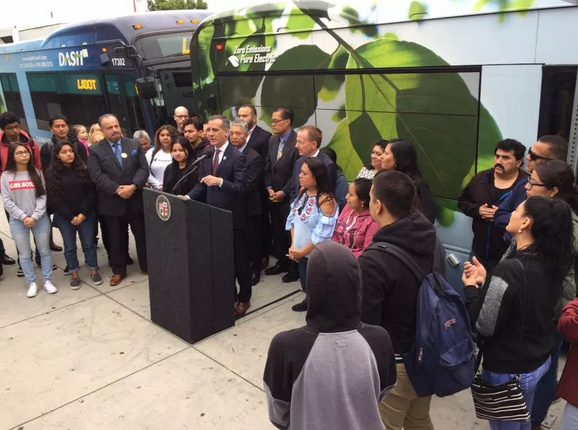Students will be able to take L.A. City DASH buses for free, starting this August.
The new one-year free student transit pilot program was announced by L.A. Mayor Eric Garcetti at a press event this morning at Miguel Contreras High School in Westlake. Garcetti was joined by leaders from Los Angeles Unified School District (LAUSD), Los Angeles Community College District (LACCD), and L.A. City Department of Transportation (LADOT.) LAUSD board president Monica Garcia called the program "a dream come true." L.A. Community College District Chancellor Francisco Rodriguez emphasized that the program removes a barrier to student achievement.
The pilot will be open to all LAUSD and LACCD students. Students must obtain a reduced fare TAP card via the Metro process, then when they TAP on LADOT DASH buses, they will automatically receive free rides.
The student transit pilot is funded by California's Low Carbon Transit Operations Program (LCTOP) which distributes cap-and-trade Greenhouse Gas Reduction Fund monies. LCTOP is somewhat unusual in that it funds operating expenses; many state/federal grant monies are limited to just capital expenses.
Earlier this year, L.A. City Councilmembers Mike Bonin and Paul Krekorian authored a motion (council file 15-0315-s4) that directed the city of L.A.'s $1,187,625 in FY 2018-19 LCTOP funds go to providing free DASH services for students. That motion was approved by the full city council and mayor.
LADOT estimates that the program will increase student transit ridership by ten percent. This morning, LADOT Assistant General Manager Jay Kim stressed that making transit more accessible to students will also "grow future ridership" by encouraging "lifelong transit riders."
Garcetti also stated that he anticipates making the one-year pilot into a permanent program.
Garcetti also speculated that "maybe Metro will be next." Metro currently operates several student pass programs, none free. There is a broad reduced fare program where any student can ride for $1 instead of the full $1.75 fare. That program is available to all students, though the application process is somewhat cumbersome, so typically only students who ride frequently go through the trouble of obtaining their reduced fare student TAP card. Metro also operates its Universal College Student Transit Pass (U-Pass) at nearly 20 colleges. For FY20, Metro is receiving $36.6 million in LCTOP money that could go toward free pass programs. Metro directed its LCTOP funding to Gold and Expo Line rail operations, both of which saw service cuts in the FY20 budget. Metro's Measure M also includes two percent annually for student/senior/disabled rider discounts. This year that will generate $17.2 million which Metro uses to pay for ongoing reduced fare programs including LIFE (Low Income Fare is Easy), paratransit, etc. Transit advocates, including Move L.A., have pushed for expanding Metro student pass programs, but leaders have failed to approve student pass funding at state and local levels.
Many of this morning's speakers also encouraged voters to get to the polls tomorrow to support the proposed Measure EE parcel tax to fund education. Also on tomorrow's ballot is L.A. City Council District 12 in the northwest San Fernando Valley.






